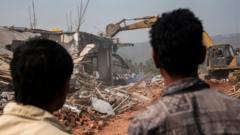The recent banning of "bulldozer justice" in India has brought hope to many, but excluded victims like Afreen Fatima still seek closure and compensation for their losses after home demolitions linked to alleged crimes.
The Aftermath of "Bulldozer Justice": Finding Closure in a New Reality

The Aftermath of "Bulldozer Justice": Finding Closure in a New Reality
Families like Afreen Fatima's grapple with loss as India's Supreme Court bans punitive demolitions, yet many remain without redress.
Afreen Fatima recalls the surreal feelings of loss and nostalgia in her new home—a stark contrast to her childhood house, torn down in 2022 as punishment for her father’s alleged involvement in a protest. The demolition of Javed Mohammad's home by authorities in Prayagraj is emblematic of the controversial "bulldozer justice," wherein homes are swiftly demolished under the pretext of illegal construction when individuals face criminal accusations. Despite the ban on such demolitions by India’s Supreme Court, Fatima remains uncertain about the future for her family and others like them who continue to suffer from this punitive practice.
In their ruling, the court emphasized the absence of legal justification for these demolitions, which have predominantly targeted Muslims, although officials argue that the practice is equally applied across communities. The ruling mandated that authorities provide prior notice before demolitions and hold officials accountable for wrongful actions. Yet, it has not addressed the plight of families already affected by these measures.
Fatima's family, having moved twice since her childhood home was demolished, fights against the legal inertia surrounding their appeals for justice. She sits haunted by memories as her father processes the profound loss of their home, a place filled with irreplaceable memories and history. “It feels like an adopted space,” she reflects on their new house, emphasizing the emotional toll of such dislocation.
As many victims wait for compensation or aid, advocates argue that legal remedies must prioritize those already victimized by unjust actions. For families like Reshma's, who face homelessness post-demolition, even the Supreme Court's guidance offers little solace. "We want actual help," she laments, emphasizing a demand for tangible support over abstract legal rulings.
Amid the wreckage of their former home, Afreen Fatima expresses both hope and skepticism about the legal system's ability to prevent similar injustices in the future. Nevertheless, she acknowledges her father's resolve to rebuild their lives, reflecting a resilience that juxtaposes with their loss. The court's decision, even if late, signals a critical juncture in acknowledging the implications of “bulldozer justice,” as lasting solutions must muffle the echoes of homes destroyed and lives disrupted.
In their ruling, the court emphasized the absence of legal justification for these demolitions, which have predominantly targeted Muslims, although officials argue that the practice is equally applied across communities. The ruling mandated that authorities provide prior notice before demolitions and hold officials accountable for wrongful actions. Yet, it has not addressed the plight of families already affected by these measures.
Fatima's family, having moved twice since her childhood home was demolished, fights against the legal inertia surrounding their appeals for justice. She sits haunted by memories as her father processes the profound loss of their home, a place filled with irreplaceable memories and history. “It feels like an adopted space,” she reflects on their new house, emphasizing the emotional toll of such dislocation.
As many victims wait for compensation or aid, advocates argue that legal remedies must prioritize those already victimized by unjust actions. For families like Reshma's, who face homelessness post-demolition, even the Supreme Court's guidance offers little solace. "We want actual help," she laments, emphasizing a demand for tangible support over abstract legal rulings.
Amid the wreckage of their former home, Afreen Fatima expresses both hope and skepticism about the legal system's ability to prevent similar injustices in the future. Nevertheless, she acknowledges her father's resolve to rebuild their lives, reflecting a resilience that juxtaposes with their loss. The court's decision, even if late, signals a critical juncture in acknowledging the implications of “bulldozer justice,” as lasting solutions must muffle the echoes of homes destroyed and lives disrupted.




















